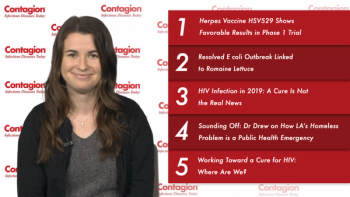
A recent study published in Transgender Health analyzed transgender and gender-nonconforming ART adherence based on the US Trans Survey, the largest survey of TGNC people in the United States.

A recent study published in Transgender Health analyzed transgender and gender-nonconforming ART adherence based on the US Trans Survey, the largest survey of TGNC people in the United States.

As December draws to a close, the Contagion® editorial team is recapping the trends and top infectious disease news of the month.

Stay up-to-date on the top infectious disease news by checking out our top 5 articles of the year.

Even as hospitals try to stop health care-associated illnesses, they can often have difficulty identifying which employees are too sick to work. New research suggests a high number of health care employees work while experiencing symptoms of illness.

A recent commentary discusses the need to uncover diagnostic and prognostic biomarkers for HIV-associated neurocognitive disorder (HAND).

Here is a look back at approvals, clearances, and authorizations granted by the US Food and Drug Administration for infectious disease products in 2019.

Here is a look at infectious disease-related US Food and Drug Administration (FDA) news from the week of December 22, 2019.

We’ve rounded up a list of important US Food and Drug Administration (FDA) and US Department of Agriculture (USDA) recalls from this past week.

A study sheds light on the challenges we need to account for in treating neglected tropical diseases.

Contagion® counts down the top HIV news stories of 2019, including FDA approvals, breakthrough discoveries, recommendations from the frontlines, and a big-picture look at just how close we are to ending the epidemic.

A new study out of Africa demonstrates that maternal-child clinics may act as a one-stop shop for both pregnancy and postpartum concerns and HIV protection.

From Ebola to measles to Salmonella, these were the top 9 infectious disease outbreaks of 2019.

Study finds coinfection is unlikely as Europe braces for influenza A.

Pharmacists have the opportunity to take a lead role in providing education on the importance of vaccines in protecting people from preventable illnesses, according to a session which took place at the American Society of Health-System Pharmacists (ASHP) 54th Midyear Clinical Meeting & Exhibition.

Rapid diagnostic tests provide a potential alternative for diagnosis of Chagas disease in the context of material constraints.

A retrospective study sought answers about infection treatment with the combination antimicrobial ceftazidime-avibactam.

Combining financial incentives and accelerated vaccine schedules may improve hepatitis B vaccination completion among people who inject drugs who are at high risk for the infection, according to a new study.

Contagion® radio is here to bring joy with every new antibiotic alert!

A literature meta-analysis determined the worldwide prevalence of hepatitis B virus in people living with HIV.

Vaccinating adults ages 27-45 years against human papillomavirus (HPV) was projected to have low public health benefits and high costs, according to a new report.

Here is a look at infectious disease-related US Food and Drug Administration (FDA) news from the week of December 15, 2019.

We’ve round up a list of important US Food and Drug Administration (FDA) and US Department of Agriculture (USDA) recalls from this past week.

Stay up-to-date on the latest infectious disease news by checking out our top 5 articles of the week.

How many nursing homes have these microbes?

A meta-analysis of seroprevalence rates estimates that one-fifth of the world’s population carries antibodies against Toxocara.

The MMWR contains new recommendations pertaining to large scale emergency response protocols.

Efforts to screen for TB in people newly diagnosed with HIV hopefully will lower death rates.

Public health officials are investigating a multistate outbreak of Listeria monocytogenes infections that have caused 4 hospitalizations and 1 death.

An analysis shows that during 2016-17, 14% of people living with HIV have used a drug-cost saving strategy and 7% have had cost saving-related nonadherence.

Global efforts to eliminate measles took a step backward, with the number of cases rising to 353,236 in 2018, up 167% from 132,413 cases in 2016.